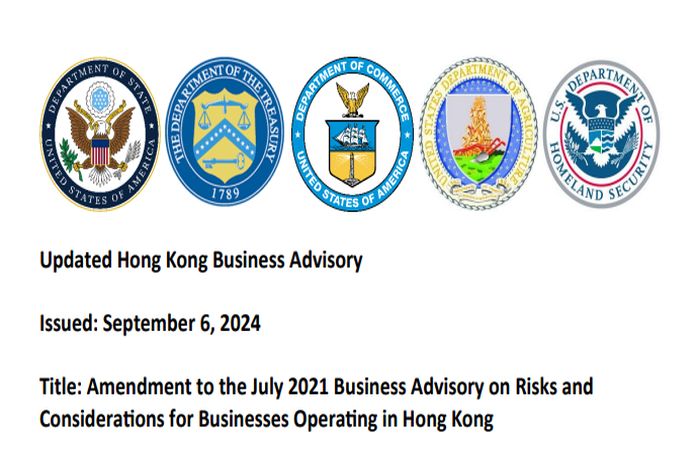US issues Hong Kong business advisory

WASHINGTON, USA – On September 6, the US Departments of State, Agriculture, Commerce, Homeland Security, and Treasury jointly released an updated (last issued in July 2021), warning US businesses about risks to their operations and activities in Hong Kong.
Many of these risks stem from the implementation of the Law of the People’s Republic of China (PRC) on Safeguarding National Security in the Hong Kong Special Administrative Region, also known as the National Security Law (NSL), and the March 2024 Safeguarding National Security Ordinance (SNS Ordinance or “Article 23”). These laws further erode fundamental freedoms and protections for human rights in Hong Kong.
Businesses should be aware that the risks they face in the PRC are now increasingly present in Hong Kong.
The NSL, the SNS Ordinance, and actions by PRC and Hong Kong authorities, such as the imposition of bounties, may negatively affect businesses’ staff, finances, legal compliance, reputation, and operations. This updated business advisory provides companies with information that can assist them in making informed business decisions and properly assessing risk.
The advisory highlights the following:
- Businesses operating in Hong Kong, as well as individuals conducting business on such companies’ behalf, are subject to the broad and vague provisions of the NSL and the SNS Ordinance.
- Businesses should be aware that the extraterritorial application of the SNS Ordinance could impact businesses and individuals outside Hong Kong.
- Businesses operating in Hong Kong face potential legal, regulatory, operational, financial, and reputational risks, including of increased scrutiny, potential financial penalties, and legal actions for perceived violations of the NSL or the SNS Ordinance.
- Businesses operating in Hong Kong may face conflicting jurisdictional requirements and liability in connection with sanctions compliance efforts. Failure to adhere to US sanctions can result in civil and criminal penalties under US law.
Source: caribbeannewsglobal.com

